过去分词短语作状语
- 格式:ppt
- 大小:223.00 KB
- 文档页数:3
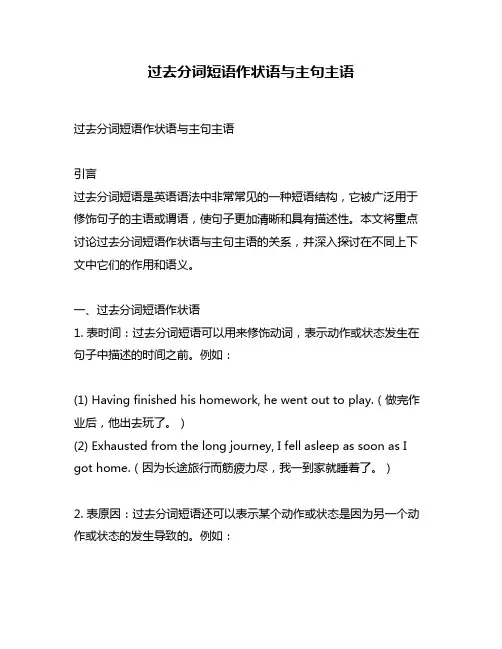
过去分词短语作状语与主句主语过去分词短语作状语与主句主语引言过去分词短语是英语语法中非常常见的一种短语结构,它被广泛用于修饰句子的主语或谓语,使句子更加清晰和具有描述性。
本文将重点讨论过去分词短语作状语与主句主语的关系,并深入探讨在不同上下文中它们的作用和语义。
一、过去分词短语作状语1. 表时间:过去分词短语可以用来修饰动词,表示动作或状态发生在句子中描述的时间之前。
例如:(1) Having finished his homework, he went out to play.(做完作业后,他出去玩了。
)(2) Exhausted from the long journey, I fell asleep as soon as I got home.(因为长途旅行而筋疲力尽,我一到家就睡着了。
)2. 表原因:过去分词短语还可以表示某个动作或状态是因为另一个动作或状态的发生导致的。
例如:(1) She missed the bus, being late for work.(她错过了公交车,因为迟到上班。
)(2) The team lost the match, having made too many mistakes.(由于犯了太多错误,队伍输掉了比赛。
)3. 表方式:过去分词短语可以描述动作的方式或方式。
例如:(1) He drove the car, carefully avoiding any obstacles.(他小心地开车,避开了任何障碍。
)(2) She completed the project, skillfully using her knowledge.(她运用自己的知识,熟练地完成了项目。
)二、过去分词短语作主句主语过去分词短语还可以作为主句的主语,这时它在句子中扮演的角色更加突出,通常表示被动或完成的动作。
1. 表示被动:过去分词短语作为主句主语时,通常表示主语所受到的动作或影响。
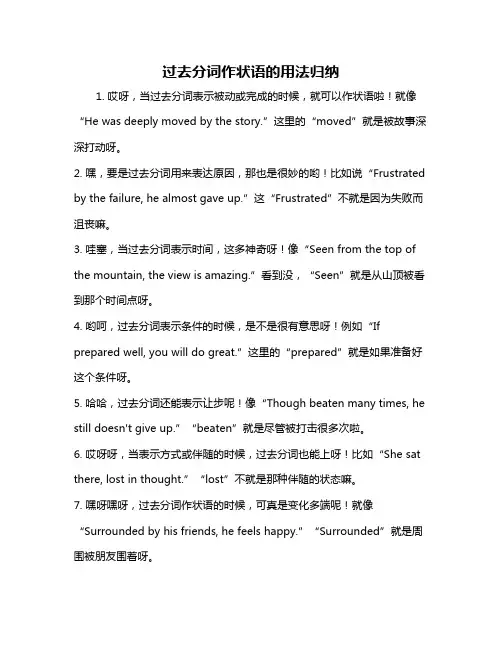
过去分词作状语的用法归纳
1. 哎呀,当过去分词表示被动或完成的时候,就可以作状语啦!就像“He was deeply moved by the story.”这里的“moved”就是被故事深深打动呀。
2. 嘿,要是过去分词用来表达原因,那也是很妙的哟!比如说“Frustrated by the failure, he almost gave up.”这“Frustrated”不就是因为失败而沮丧嘛。
3. 哇塞,当过去分词表示时间,这多神奇呀!像“Seen from the top of the mountain, the view is amazing.”看到没,“Seen”就是从山顶被看到那个时间点呀。
4. 哟呵,过去分词表示条件的时候,是不是很有意思呀!例如“If prepared well, you will do great.”这里的“prepared”就是如果准备好这个条件呀。
5. 哈哈,过去分词还能表示让步呢!像“Though beaten many times, he still doesn't give up.”“beaten”就是尽管被打击很多次啦。
6. 哎呀呀,当表示方式或伴随的时候,过去分词也能上呀!比如“She sat there, lost in thought.”“lost”不就是那种伴随的状态嘛。
7. 嘿呀嘿呀,过去分词作状语的时候,可真是变化多端呢!就像“Surrounded by his friends, he feels happy.”“Surrounded”就是周围被朋友围着呀。
8. 哇哦,过去分词这么有用,大家可得好好掌握呀!
总之,过去分词作状语的用法很多,大家要多多练习,才能运用自如呀!。
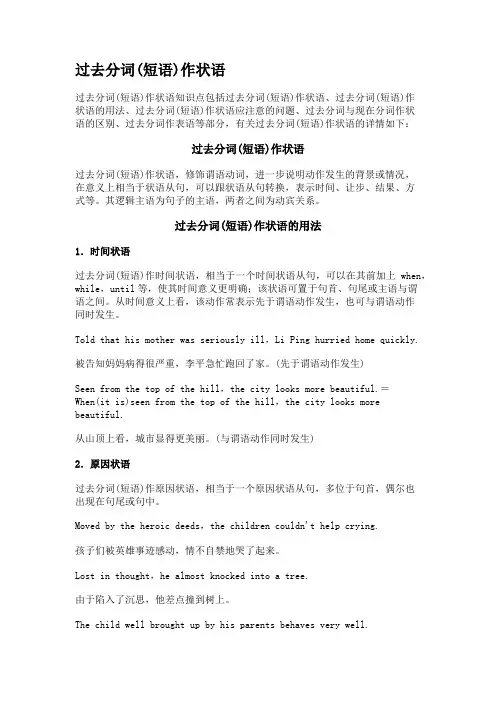
过去分词(短语)作状语过去分词(短语)作状语知识点包括过去分词(短语)作状语、过去分词(短语)作状语的用法、过去分词(短语)作状语应注意的问题、过去分词与现在分词作状语的区别、过去分词作表语等部分,有关过去分词(短语)作状语的详情如下:过去分词(短语)作状语过去分词(短语)作状语,修饰谓语动词,进一步说明动作发生的背景或情况,在意义上相当于状语从句,可以跟状语从句转换,表示时间、让步、结果、方式等。
其逻辑主语为句子的主语,两者之间为动宾关系。
过去分词(短语)作状语的用法1.时间状语过去分词(短语)作时间状语,相当于一个时间状语从句,可以在其前加上when,while,until等,使其时间意义更明确;该状语可置于句首、句尾或主语与谓语之间。
从时间意义上看,该动作常表示先于谓语动作发生,也可与谓语动作同时发生。
Told that his mother was seriously ill,Li Ping hurried home quickly.被告知妈妈病得很严重,李平急忙跑回了家。
(先于谓语动作发生)Seen from the top of the hill,the city looks more beautiful.=When(it is)seen from the top of the hill,the city looks more beautiful.从山顶上看,城市显得更美丽。
(与谓语动作同时发生)2.原因状语过去分词(短语)作原因状语,相当于一个原因状语从句,多位于句首,偶尔也出现在句尾或句中。
Moved by the heroic deeds,the children couldn't help crying.孩子们被英雄事迹感动,情不自禁地哭了起来。
Lost in thought,he almost knocked into a tree.由于陷入了沉思,他差点撞到树上。

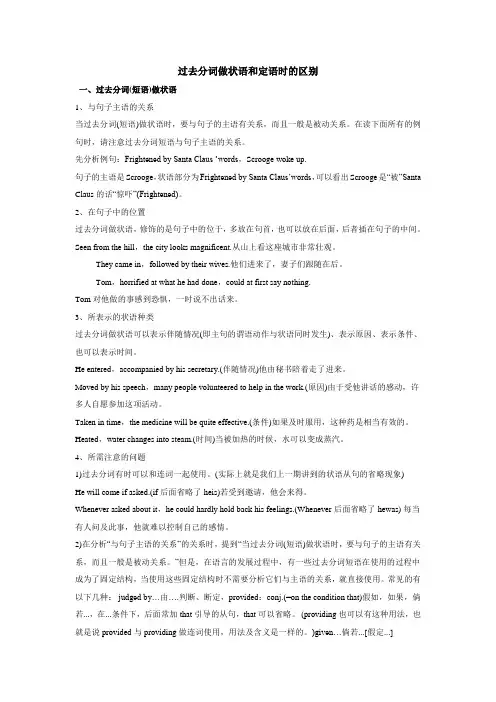
过去分词做状语和定语时的区别一、过去分词(短语)做状语1、与句子主语的关系当过去分词(短语)做状语时,要与句子的主语有关系,而且一般是被动关系。
在读下面所有的例句时,请注意过去分词短语与句子主语的关系。
先分析例句:Frightened by Santa Claus …words,Scrooge woke up.句子的主语是Scrooge,状语部分为Frightened by Santa Claus‟words,可以看出Scrooge是“被”Santa Claus的话“惊吓”(Frightened)。
2、在句子中的位置过去分词做状语,修饰的是句子中的位于,多放在句首,也可以放在后面,后者插在句子的中间。
Seen from the hill,the city looks magnificent.从山上看这座城市非常壮观。
They came in,followed by their wives.他们进来了,妻子们跟随在后。
Tom,horrified at what he had done,could at first say nothing.Tom对他做的事感到恐惧,一时说不出话来。
3、所表示的状语种类过去分词做状语可以表示伴随情况(即主句的谓语动作与状语同时发生)、表示原因、表示条件、也可以表示时间。
He entered,accompanied by his secretary.(伴随情况)他由秘书陪着走了进来。
Moved by his speech,many people volunteered to help in the work.(原因)由于受他讲话的感动,许多人自愿参加这项活动。
Taken in time,the medicine will be quite effective.(条件)如果及时服用,这种药是相当有效的。
Heated,water changes into steam.(时间)当被加热的时候,水可以变成蒸汽。
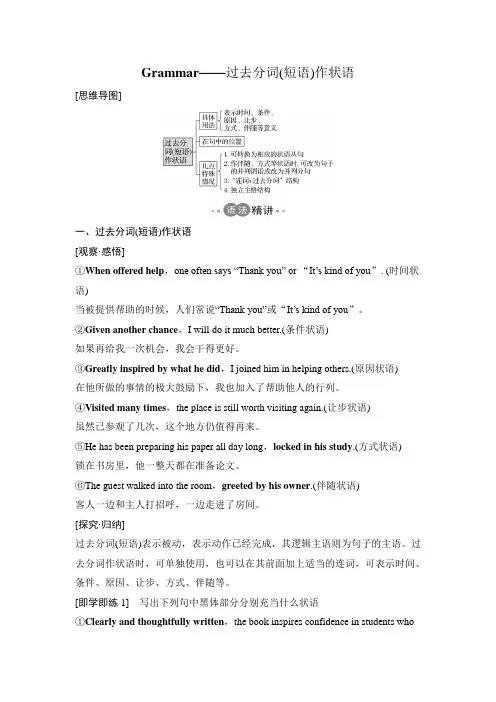
Grammar——过去分词(短语)作状语[思维导图]一、过去分词(短语)作状语[观察·感悟]①When offered help,one often says “Thank you” or “It’s kind of you”.(时间状语)当被提供帮助的时候,人们常说“Thank you”或“It’s kind of you”。
②Given another chance,I will do it much better.(条件状语)如果再给我一次机会,我会干得更好。
③Greatly inspired by what he did,I joined him in helping others.(原因状语)在他所做的事情的极大鼓励下,我也加入了帮助他人的行列。
④Visited many times,the place is still worth visiting again.(让步状语)虽然已参观了几次,这个地方仍值得再来。
⑤He has been preparing his paper all day long,locked in his study.(方式状语)锁在书房里,他一整天都在准备论文。
⑥The guest walked into the room,greeted by his owner.(伴随状语)客人一边和主人打招呼,一边走进了房间。
[探究·归纳]过去分词(短语)表示被动,表示动作已经完成,其逻辑主语则为句子的主语。
过去分词作状语时,可单独使用,也可以在其前面加上适当的连词,可表示时间、条件、原因、让步、方式、伴随等。
[即学即练1]写出下列句中黑体部分分别充当什么状语①Clearly and thoughtfully written,the book inspires confidence in students whowish to seek their own answers.原因状语②Time,used correctly,is money in the bank.条件状语③If asked to look after luggage for someone else,inform the police at once.条件状语④Seated at the table,my father and I were talking about my job.方式状语⑤When (you are) given a medical examination,you should keep calm.时间状语二、过去分词(短语)作状语时在句中的位置[观察·感悟]①Done in a hurry,his homework was full of mistakes.因为做得匆忙,他的作业满是错。
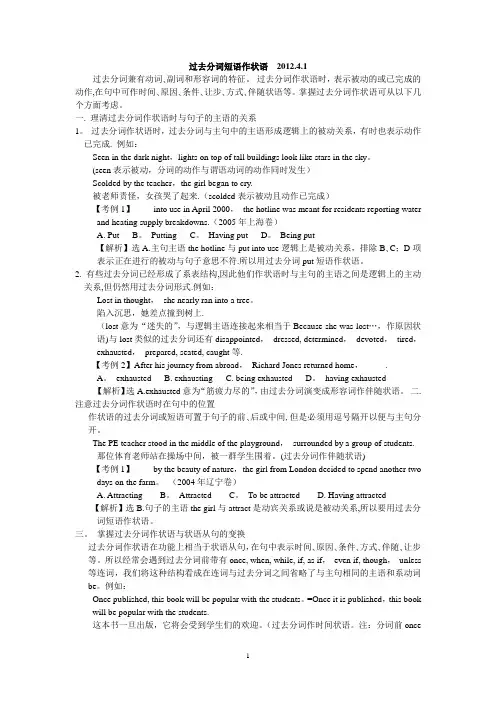
过去分词短语作状语2012.4.1过去分词兼有动词、副词和形容词的特征。
过去分词作状语时,表示被动的或已完成的动作,在句中可作时间、原因、条件、让步、方式、伴随状语等。
掌握过去分词作状语可从以下几个方面考虑。
一. 理清过去分词作状语时与句子的主语的关系1。
过去分词作状语时,过去分词与主句中的主语形成逻辑上的被动关系,有时也表示动作已完成. 例如:Seen in the dark night,lights on top of tall buildings look like stars in the sky。
(seen表示被动,分词的动作与谓语动词的动作同时发生)Scolded by the teacher,the girl began to cry.被老师责怪,女孩哭了起来.(scolded表示被动且动作已完成)【考例1】____ into use in April 2000,the hotline was meant for residents reporting water and heating supply breakdowns.(2005年上海卷)A. Put B。
Putting C。
Having put D。
Being put【解析】选A.主句主语the hotline与put into use逻辑上是被动关系,排除B、C;D项表示正在进行的被动与句子意思不符.所以用过去分词put短语作状语。
2. 有些过去分词已经形成了系表结构,因此他们作状语时与主句的主语之间是逻辑上的主动关系,但仍然用过去分词形式.例如:Lost in thought,she nearly ran into a tree。
陷入沉思,她差点撞到树上.(lost意为“迷失的”,与逻辑主语连接起来相当于Because she was lost…,作原因状语)与lost类似的过去分词还有disappointed,dressed, determined,devoted,tired,exhausted,prepared, seated, caught等.【考例2】After his journey from abroad,Richard Jones returned home,____.A。
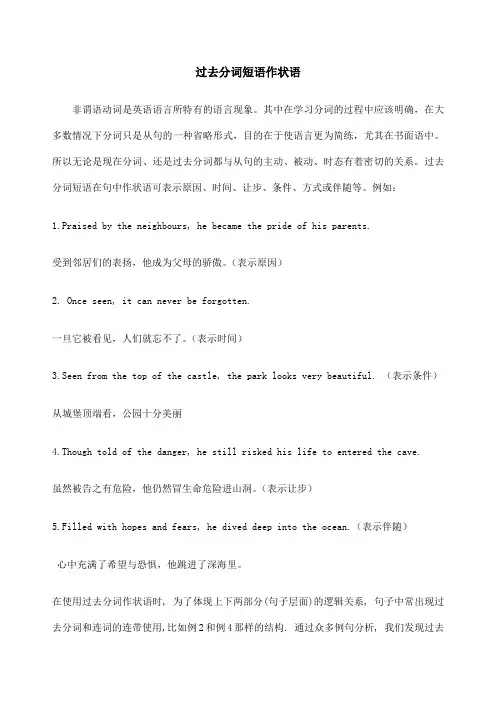
过去分词短语作状语非谓语动词是英语语言所特有的语言现象。
其中在学习分词的过程中应该明确,在大多数情况下分词只是从句的一种省略形式,目的在于使语言更为简练,尤其在书面语中。
所以无论是现在分词、还是过去分词都与从句的主动、被动、时态有着密切的关系。
过去分词短语在句中作状语可表示原因、时间、让步、条件、方式或伴随等。
例如:1.Praised by the neighbours, he became the pride of his parents.受到邻居们的表扬,他成为父母的骄傲。
(表示原因)2. Once seen, it can never be forgotten.一旦它被看见,人们就忘不了。
(表示时间)3.Seen from the top of the castle, the park looks very beautiful. (表示条件)从城堡顶端看,公园十分美丽4.Though told of the danger, he still risked his life to entered the cave.虽然被告之有危险,他仍然冒生命危险进山洞。
(表示让步)5.Filled with hopes and fears, he dived deep into the ocean.(表示伴随)心中充满了希望与恐惧,他跳进了深海里。
在使用过去分词作状语时, 为了体现上下两部分(句子层面)的逻辑关系, 句子中常出现过去分词和连词的连带使用,比如例2和例4那样的结构. 通过众多例句分析, 我们发现过去分词作状语以下几种情形:一、句子的主语与作状语用的过去分词之间在逻辑上是被动的关系例:_______ by the beauty of nature, the girl from London decided to spend another two days on the farm .(2004,辽宁)A.Attracting B.Attracted C. To be attracted D.Having attracted 分析:答案为B。
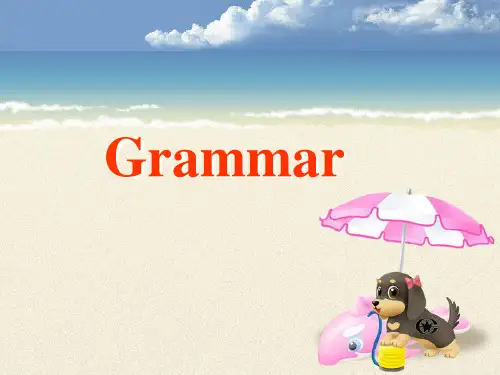
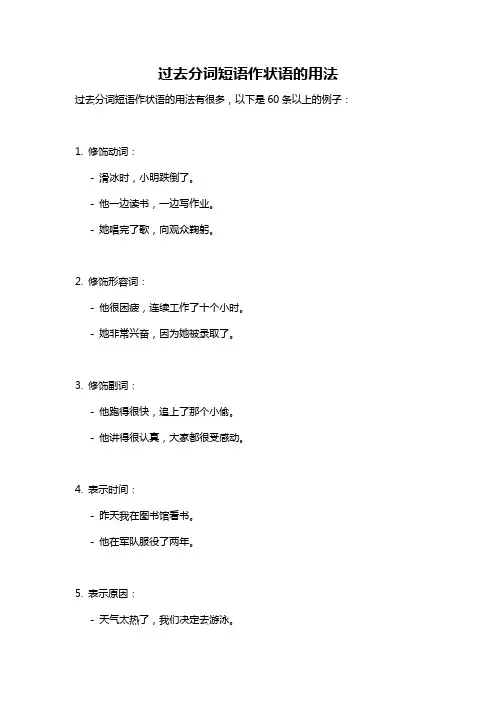
过去分词短语作状语的用法过去分词短语作状语的用法有很多,以下是60条以上的例子:1. 修饰动词:- 滑冰时,小明跌倒了。
- 他一边读书,一边写作业。
- 她唱完了歌,向观众鞠躬。
2. 修饰形容词:- 他很困疲,连续工作了十个小时。
- 她非常兴奋,因为她被录取了。
3. 修饰副词:- 他跑得很快,追上了那个小偷。
- 他讲得很认真,大家都很受感动。
4. 表示时间:- 昨天我在图书馆看书。
- 他在军队服役了两年。
5. 表示原因:- 天气太热了,我们决定去游泳。
- 因为过去常常下雨,他没有收获到很多庄稼。
6. 表示结果:- 摔跤后,他的腿受伤了。
- 长时间的用眼使她的视力变差了。
7. 表示条件:- 如果得了好成绩,他们就会给她一个奖学金。
- 假如你赢了比赛,我会带你去庆祝。
8. 表示让步:- 尽管难以置信,他们完成了任务。
- 即使生活各方面都很困难,他也从未放弃。
9. 表示方式:- 他小声地说,以免被听到。
- 警察把他粗暴地逮捕起来。
10. 表示伴随:- 我们一起坐在海滩上看着日落。
- 在音乐声中,他们舞蹈了一整晚。
11. 表示目的:- 他去邮局寄信。
- 我们买了一些食物,为了备不时之需。
12. 表示程度:- 晚餐做得很好,大家都吃得很饱。
- 雨下得很大,我们都淋湿了。
13. 表示顺序:- 他按照指示一步一步地进行。
- 他按照说明书安装了电视。
14. 表示比较:- 她比我学得更快。
- 这部电影比预期更好看。
15. 表示条件:- 假如你想要通过考试,你就需要努力学习。
- 如果下雨,我们就会取消野餐计划。
16. 表示结果:- 失去工作,他变得沮丧。
- 她的努力得到了回报。
17. 表示时间:- 经历了许多困难,他终于实现了梦想。
- 她看了一会电视,然后出去散步。
18. 表示原因:- 由于道路交通拥堵,我们迟到了。
- 风大得让树都被吹倒了。
19. 表示让步:- 尽管工作很忙,他还是找时间陪孩子。
- 即使受伤了,他仍然坚持比赛。

过去分词作状语用法归纳一、过去分词(短语)作状语时,其逻辑主语通常就是句子的主语。
过去分词(短语)作状语一般都用逗号同其它成分隔开。
1. 作时间状语时,可转换为when或while等引导的从句,通常放在句首。
如:Seen from the top of the hill (= When it is seen from the top of the hill), the school looks like a big garden.2. 作条件状语时,可转换为once, if或unless等引导的从句,一般放在句首。
如:Given more attention (= If it was given more attention), the fire could have been avoided.3. 作原因状语时,可转换为because, as或since等引导的从句,多放在句首。
如:Encouraged (= As she was encouraged) by the teacher, the girl was very happy.4. 作让步状语时,可转换为though, although 或even if引导的从句,常放在句首。
如:Left (= Although she was left) alone at home, Jenny didn’t feel afraid at all.5. 作方式或伴随状语时,常可转换为并列分句,可位于句首或句末。
如:Surrounded by his students, the teacher went into the lab. (= The teacher was surrounded by his students and he went into the lab.)6. 过去分词(短语)作状语时,有时为了强调,前面可带连词when, while, if, though, as if, unless等。
非谓语动词:过去分词过去分词短语作状语过去分词表示完成或被动,作状语时,表示动作发生的背景或者情况,在意义上相当于一个状语从句,其省略的主语逻辑主语是主句的主语,且与主语之间存在被动关系;过去分词作状语可以表示时间、条件、方式、原因、让步等;过去分词的否定式是将not放在其前面;一、过去分词作状语时的具体用法:1)过去分词作时间状语时,相当于一个时间状语从句;有时过去分词前可加连词when或while来强调时间概念.例:1. Asked When he was asked what had happened, his face turned red.当他被问及发生了什么的时候,他的脸红了;2. When heated When it is heated, water changes into steam. 当加热时,水变成水蒸气;3.Told that his mother was illWhen he was told that his mother was illl, Li Lei hurried homequickly. 李蕾得知母亲生病了时,马上赶回了家;4. Seen from the moonWhen it is seen from the moon , the earth looks green. 从月亮上看时,地球是绿色;2)过去分词作原因状语时,相当于一个由as, since, because等词引导的原因状语从句;例:1. Deeply Because they were moved by the movie, the children began to cry.由于被电影深深地感动,孩子们哭了起来;2. Frightened Because she was frightened by the horror movie, the girl didn't dare to sleepalone. 因为被惊悚电影吓坏了,这个女孩不敢单独睡觉;3. Caught in a heavy rain Because he was caught in a..., he was all wet.4. Satisfied with what he did Because the teacher was satisfied with..., the teacherpraised him in class. 由于老师对他所做的事情很满意,于是在班上表扬了他;3)过去分词作条件状语时,通常放在句子的前面,相当于if, unless等引导的条件状语从句; 例:1. Compared with you If we are compared , we still have a long way to go.和你们比起来,我们还有很长的一段路要走;2. Grown If these seeds are grown in rich soil, these seeds can grow fast.如果种在肥沃的土壤里,这些种子能长得很快;3. Given more time If we were given more time, we would be able to do the work muchbetter.4. Given a few minutes If I am given a few minutes, I’ll finish it. 再给几分钟的时间,我就会完成了4)过去分词作让步状语时,相当于一个以though / although引导的让步状语从句,这类分词或分词短语一般放在句子前面;例:1. Left Although he was left at home, John didn't feel afraid at all.虽然John被单独留在房间里, 他一点都不害怕;2. Invited by him Though I was invited by them , I won’t take part in the party.即使被邀请,我也不会参加聚会的;3. Explained a hundred times Although he was explained... , he still can’t understand it. 即使给他解释一百篇,她还是不会明白;4.Trained ten hours a day Though he was trained..., he will still be a fool. 即使每天训练十个小时,他也还会是个傻瓜;5)过去分词作状语表方式或伴随状语时不用状语从句替换,但可以改写成并列句;例:1.She walked out of the house, and she was followed by her little daughter.她走出房子,后面跟着她小女儿;2. She was Dressed in white, and she looked really pretty.穿着白衣服,她看起来确实很美;3.She sat by the window, and she was lost in thought.二、过去分词与现在分词作状语的区别:1)过去分词表完成、被动,与主句的主语之间是被动关系;现在分词表进行、主动,与主句的主语之间是主动关系;试比较:Following the old man, we went upstairs. 跟着那个老人, 我们上了楼;= We followed the old man, and we went upstairs.Followed by the old man, we went upstairs. 我们上了楼, 后面跟着那个老人;= We were followed by the old man, and we went upstairs.Seen from the top, the stadium looks like a bird nest. 从上面看,体育场好像一个鸟巢;Seeing from space, the astronaut can not discover the Great Wall. 从太空看,宇航员看不到长城;2)若分词主语与句中主语不一致,则可以用其他方法来修正;①用with的复合结构等.②改为相应的状语从句来表达;③给分词添加自己的主语,构成独立主格结构④改变语态;例如:完成作业后,孩子们出去踢足球了;Finished their homework, the children went out to play football. ×Their homework finished, the children went out to play football. 独立主格Having finished their homework, the children went out to play football.现在分词完成形式With their homework finished表时间, the children went out to play football. with的复合结构After finishing their homework, the children went out to play football. 介词+动名词例如:当他过马路时,一辆车撞到了他;误:Crossing the road, a car knocked him down.误:Crossed the road, he was knocked down by a car.正:Crossing the road, he was knocked down by a car. 过马路时他被车撞倒了;正:When he was crossing the road, a car knocked him down. 他过马路时车子把他撞倒了; ※注意:的由来解决状语分词的逻辑主语与句子主语不一致的问题,也可在分词前加一个名词或代词,使之成为分词的逻辑主语;由于加在分词前的名词或代词要用主格形式,例:He crossing the road, a car knocked him down.The job finished, we went home. 工作结束后我们就回家了;The weather being fine, we went swimming. 天气很好,我们就去游泳了;He being absent, nothing couldn’t be done. 由于他缺席,什么事也干不成;误:Barking madly,I led the dog out.正:The dog barking madly, I led it out.正:Barking madly,the dog was let out by me.正:Becuase the dog was barkling madly, I led it out.正:With the dog barking madly, I led it out.三、有些过去分词因源于系表结构,已经被形容词化;故作状语时不表被动而表主动,表示人的状态;get lost; be lost in沉溺于;be seated; be compared withbe dressed in; be born; be tired of 厌烦; be tired from be worried about表状态be interested in; be moved by; be disappointed at; be surprised at四、选择现在分词还是过去分词,关键看主句的主语;如分词的动作是主句的主语发出,分词就选用现在分词,反之就用过去分词;Used for a long time, the book looks old. Using the book, I find it useful.Looking at her, he jumped with joy. Looked at by her, he jumped with joy.五、正如第四点所说,不论是动词不定式作状语、-ing分词做状语,还是动词的过去分词作状语,其逻辑主语必须是句子的主语;但是,有一些非谓语动词短语已经游离出来,成为单独的短语,在句子中作状语;如:1 exactly / honestly / frankly / generally speaking, 准确地说不过去/ 老实地说/ 坦率地说/ 一般说来;例:1. Exactly speaking, he got here at eight fourteen this morning. 准确地说,今天早晨他是十八点十四分来到这里的;2. Generally speaking, a snake won’t attack a man unless it is bothered. 一般说来,蛇是不会攻击人的除非你冒犯了它;2 / by... 从/ 根据某东西判断例:1. Judging by his accent, he is from Hunan. 从他的口音来判断,他是湖南人;2. Judging from what he said, he is very honest. 从他所说的话来判断,它是很诚实的;3 providing / provided …假如/ 如果例:1. Providing he follows our advice, we can help him. 要是他按我们的建议去做,我们就能帮助他;2. Provided he is free, he is sure to come. 如果他有空,他肯定会来;4 considering... 考虑到例:1. Considering he was just a little boy, we didn’t punish him. 考虑到他还只是一个小孩,我们就没有惩罚他了;2. Considering it was late, we didn’t discuss the question. 考虑到时间不早了,我们就没有讨论这个问题了;5 ... 想到/ 考虑到例:Thinking of the environment we live in, the waste can’t be thrown away around directly. 考虑到我们所生存的环境,废物不能直接到处乱扔;6 talking of... 谈到/ 说到例:Talking of math, he became excited. 谈到数学,他就兴奋起来了;此外,还有短语:taking...into consideration 把某事考虑进去;calculating roughly, 粗略地计算;supposing... 假定;to tell you the truth 实话告诉你;to be frank 坦白地说;to begin with 首先要做的是;so to speak 可以这么说;taken as a whole 从整体上来看;put frankly, 坦率地说;鉴于等;Ilearn过去分词:作状语练习Multiple Choices Given a lever, anyone can move the earth with it.1.____ into English, the sentence was found to have an entirely different word order.A.TranslatingB. TranslatedC. To translateD. Having translated2.____ the right kind of training, these teenage soccer players may one day grow into international stars.A. GivingB. Having givenC. To giveD. Given3.____ an important role in a new movie, Andy has got a chance to become famous.A. OfferB. OfferingC. OfferedD. To offer4.____ twice, the postman refused to deliver our letters unless we chained our dog.A. Being bittenB. BittenC. Having bittenD. To be bitten5.____ from the top of the tower, the south foot of the mountain is a sea of trees.A. SeenB. SeeingC. Having seenD. To see6.____ time, he’ll make a first-class tennis player.A. Having givenB. To givenC. GivingD. Given7.The island, ____ to the mainland by a bridge, is easy to go to.A. joiningB. to joinC. joinedD. having joined8.____ from this point of view, the question will be of great importance.A. ConsideringB. ConsiderC. To considerD. Considered9.When ____ through the book, I came across an interesting picture.A. lookB. lookingC. lookedD. being looked10.____ that film, I am afraid I cannot say anything about it.A. Not having seenB. Having seenC. Having been seenD. Not seen。
过去分词(短语)作状语吴国斌过去分词(短语)作状语,它的逻辑主语通常就是句子的主语,过去分词与主语之间是动宾关系,即被动关系。
过去分词(短语)作状语可以表时间、原因、条件、让步、方式或伴随情况等。
1.时间状语过去分词作时间状语,相当于一个时间状语从句。
也可在过去分词前加上连词when,while,until等,使其时间意义更明确。
Seen from the top of the hill, the city looks more beautiful=When it is seen from the top of the hill, the city looks more beautiful.从山顶看,城市显得更漂亮。
Don’t speak until asked to.=Don’t speak until you are asked to.当被要求发言时,你才能讲话。
2.原因状语过去分词作原因状语,相当于一个原因状语从句。
Encouraged by the progress he has made, he works harder.=As he is encouraged by the progress he has made, he works harder.由于受到所取得的进步的鼓励,他工作更努力了。
3.条件状语作条件状语的过去分词(短语)可转换为if,unless等引导的条件状语从句。
United we will stand; divided we will fall.=If we are united we will stand; if we are divided we will fall.团结写就是胜利,分裂必然失败。
4.让步状语作让步状语的过去分词(短语)可转换为although,though或even if/though 等引导的让步状语从句。
Though warned of the storm, the farmers were still working in the fields.=Though they had been warned of the storm, the farmers were still working in the fields.虽然农民们已被警告将有风暴,但他们仍然在地里干活。
过去分词用作状语过去分词作状语主要是说明谓语动作发生的背景或条件;表示原因、时间、条件、让步、方式或伴随情况等。
过去分词可置于主句前,也可置于主句后,用逗号与主句隔开。
1. 原因状语Choked by the heavy smoke, he could hardly breathe. 他被浓烟呛了,几乎不能呼吸了。
Caught in a heavy rain, he was all wet. 因为淋了一场大雨,所以他全身湿透了。
Frightened by the noise in the ni ght, the girl didn’t dare to sleep in her room. 受到夜晚响声的惊吓,那姑娘不敢睡在她的房间。
2. 时间状语Left to itself in the room, the baby began to cry.当被孤独地留在房间里时,婴儿哭了起来。
Asked why he did it, the monitor said it was his duty. 当被问及这件事时,班长说这是他的职责。
Approached in the dark, the lights looked lonely and purposeless. 在黑暗中走近时。
那些电灯显得孤单而无意义。
3. 条件状语Seen in this aspect, the matter isn’t as serious as people generally suppose.如果从这个角度看,问题并不像人们一般预料的那样`严重。
Grown in rich soil, these seeds can grow fast. 如果种在肥沃的土壤里,这些种子能长得很快。
Given better attention, the accident could have been avoided. 要是多加注意,那次事故就能避免了。
过去分词作状语的例句英语一.过去分词(短语)作状语表示动作发生的背景或情况,在意义上相当于一个状语从句,其逻辑主语就是句子的主语。
过去分词(短语)在句中作状语可以表示时间、条件、方式或伴随、让步、原因等。
1.表示时间:过去分词(短语)做时间状语,相当于一个时间从句。
例如:Asked about his family, he made no answer=When he was asked about his family, he made no answer.当问到有关他的家庭的情况时,他没有回答。
2.表示条件:过去分词(短语)做条件状语,相当于一个条件状语从句。
这类句子的谓语动词往往用将来时或情态动词。
例如:United, we stand;divided,we fall=If we are united,we stand;if we are divided, we fall.团结,我们就能独立;分裂,我们必然倒下。
3.表示方式或伴随:过去分词(短语)做方式或伴随状语,可以转换成一个并列句。
例如:The boy slipped out of the room, followed by his pet dog=The boy slipped out of the room and was followed by his pet dog.这个男孩溜出了房间,后面跟着他的宠物狗。
4.表示让步:过去分词(短语)做让步状语,相当于一个让步状语从句。
例如:Rejected many times, the man did not lose heart=Though the man was rejected many times, he did not lose heart.虽然被拒绝了很多次,这个人并没有失去信心。
5.表示原因:过去分词(短语)作原因状语,相当于一个原因状语从句。
例如:Seriously injured, he had to be taken to the hospital=Because he was seriously injured, he had to be taken to the hospital.由于伤得很严重,只好把他送往医院。